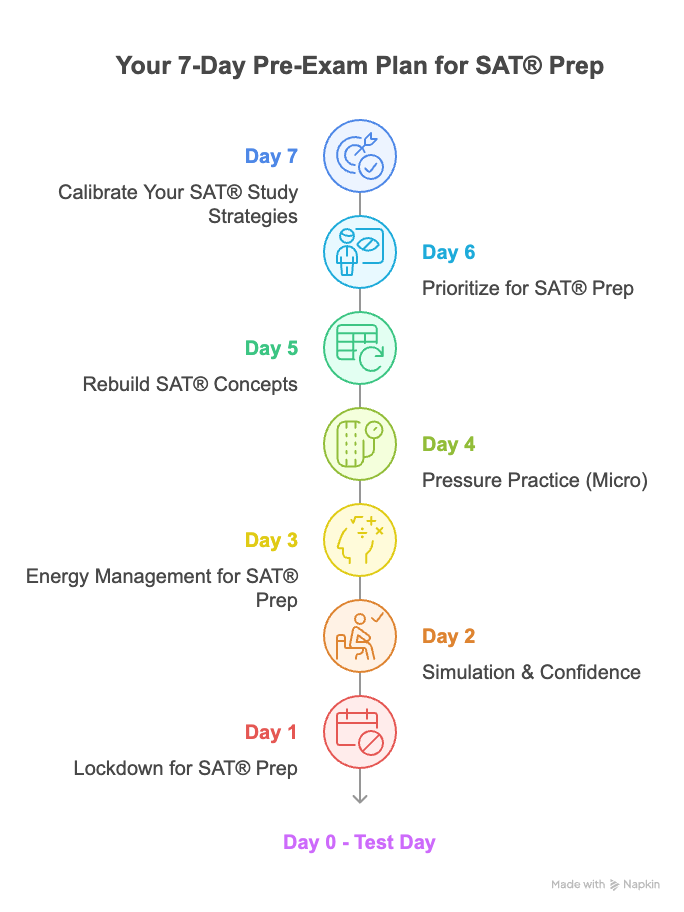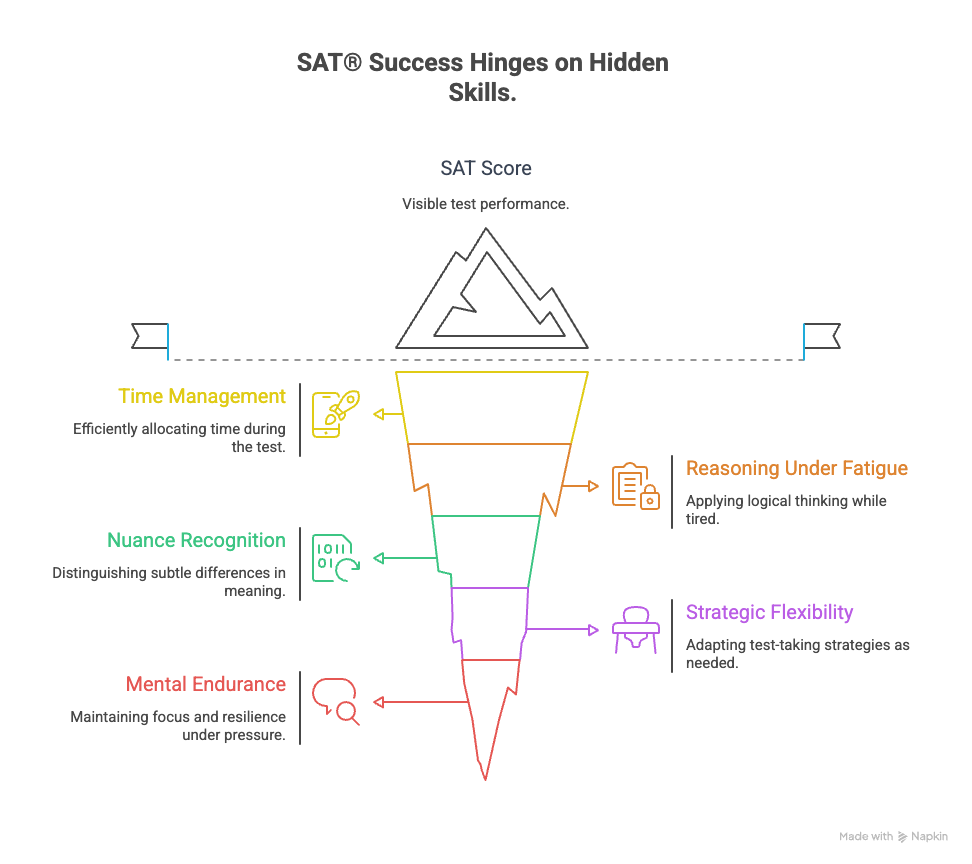If you're seven days out from a high-stakes test like the SAT®, you're either:
- Still scrambling to review.
- Doing too much out of panic.
- Or doing nothing out of burnout.
Most students peak too early or crash too late. They treat the final week like a sprint, or worse, a cliff. But your brain doesn’t need panic for SAT® prep. It needs precision.
This guide gives you a 7-day strategy to stay clear, stay focused, and walk into your SAT® ready, not rushed. It's all about effective SAT® study strategies and building mental resilience.
Let's Start with the Psychology of SAT® Prep
1. Peak-End Rule (Kahneman & Redelmeier)
Your brain remembers experiences based on two moments:
- The most intense point (the "peak")
- The final moment (the "end")
Translation? How you feel and perform in this final week disproportionately shapes your SAT® test-day mindset. This is crucial for SAT® and mental resilience.
2. Cognitive Tapering
In sports, the week before a competition is about tapering: reducing intensity while maintaining quality. This gives the body, and especially the brain, time to recalibrate and consolidate for optimal performance. This concept is directly applicable to your SAT® prep.
3. Rest-Performance Ratio
Mental performance improves when rest is built into the system. The week before an SAT® test should include controlled output, not overtraining. This is one of the most effective SAT® study strategies you can adopt.
Your 7-Day Pre-Exam Plan for SAT® Prep
This plan is designed for balance, not burnout, helping you build SAT® and mental resilience.
Day 7 (One Week Out): Calibrate Your SAT® Study Strategies
- Take one full-length timed SAT® practice test in realistic conditions.
- Analyze your timing, mental stamina, and mistake types.
- Don’t fix everything. Just observe.
This is your final data point for your SAT® prep, not your final performance.
Day 6: Prioritize for SAT® Prep
- Review the full test.
- Identify your top 3 weak areas for the SAT®.
- Make a list: "If I improved only these, I’d gain the most points."
Pick focus, not volume, in your SAT® study strategies.
Day 5: Rebuild SAT® Concepts
- Relearn 1-2 key concepts per weak area.
- Use examples, not just definitions.
- Teach it aloud or walk through mistakes.
This is targeted reconstruction for your SAT® prep, not new learning.
Day 4: Pressure Practice (Micro) for SAT® and Mental Resilience
- Set a timer for 25 minutes.
- Do a mini SAT® section or passage under full exam conditions.
- Track how your mind behaves under time pressure.
This isn’t about accuracy. It’s about stress calibration, a key aspect of SAT® and mental resilience.
Day 3: Energy Management for SAT® Prep
- Review flashcards, errors, or light content.
- Cut your SAT® study time by 30%.
- Go outside. Move your body.
This is your mental taper day. You’re not building muscle anymore; you’re preserving it for the SAT®.
Day 2: Simulation & Confidence for SAT® Study Strategies
- Do one final half-length SAT® practice test.
- Focus on rhythm, not speed.
- End with something you're good at.
End with proof that you're prepared for the SAT®, not anxiety that you’re not perfect.
Day 1: Lockdown for SAT® Prep
- No new content for the SAT®.
- No scrolling of "last-minute tips."
- Set up logistics (admission ticket, pencils, ID, clothes, food).
- Wind down early.
- Visualize how you'll handle nerves during the SAT®.
- Sleep.
This is not a study day. This is a stabilization day for your SAT® and mental resilience.
Day 0: SAT® Test Day
You’re not just walking into the SAT® with content. You’re walking in with pattern recognition, recovery tools, and the ability to stay present.
You’re not there to feel perfect. You’re here to perform under pressure, and you’ve trained for that with your SAT® study strategies.






